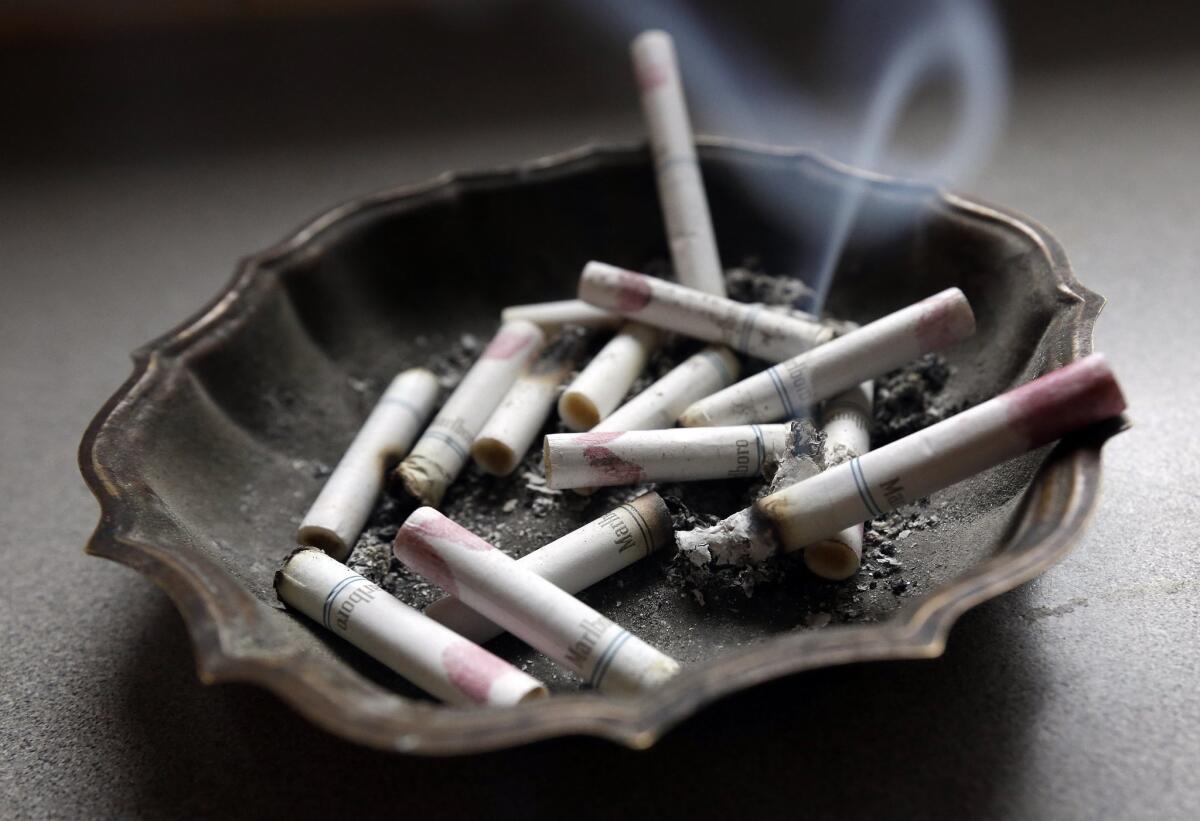Q&A: Raising smoking age to 21 should ease peer pressure on California’s kids, backers say

California raised its smoking age from 18 to 21 this week.
California has become the second state after Hawaii to increase the smoking age from 18 to 21. The law was passed in May and went into effect Thursday.
Backers of this campaign say raising the smoking age could make a major dent in what remains the leading cause of preventable death in the U.S., with as many as 34,000 Californians dying each year.
Why do those three years matter so much?
The group Tobacco Free Kids say those three years are critical in whether someone becomes a smoker.
“National data show that 95% of adult smokers begin smoking before they turn 21,” the group wrote. “The ages of 18 to 21 are also a critical period when many smokers move from experimental smoking to regular, daily use. While less than half of adult smokers become daily smokers before age 18, four out of five do so before they turn 21.”
Other experts say raising the age would reduce peer pressure to smoke. For example, if older high school seniors are not allowed to smoke, it would make it harder for younger high school students to pick up the habit.
“The likelihood of a 16- or 17-year-old having 21- or 22-year-old friends — it is less likely,” Joshua Yang, a Cal State Fullerton associate professor of health science told the Orange County Register.
When Hawaii raised the age earlier this year, state heath officials said they expected the law to have a big impact.
“In Hawaii, about one in four students in high school try their first cigarette each year, and one in three who get hooked will die prematurely,” said Lola Irvin, administrator with the chronic disease prevention and health promotion division of the Hawaii Department of Health.
Do we know what kind of dent this could have?
A 2015 Institute of Medicine study estimated that increasing the tobacco purchase age to 21 would result in 200,000 fewer premature deaths for those born between 2000 and 2019.
Does the California law have any exceptions?
After some lawmakers objected that 18-year-olds can join the military but would be banned from smoking, Hernandez changed his bill to exempt people in active military service.
Will this hurt business?
New York City raised the age for buying tobacco products to 21 in 2013, with a big push from then-Mayor Michael Bloomberg. Some store owners objected to the law, saying it would bring a drop in business not just for cigarettes but other items.
Bloomberg rejected that criticism.
“People always try to put things like selling cigarettes in the context of jobs and whether or not it helps or hurts stores,” he said when signing the bill. “I think that is just so outrageously misplaced. This is an issue of whether we’re going to kill people. This century a billion people will die from smoking around the world. And we don’t want any of the people to die to be New Yorkers.”
What are people saying about California’s action?
The package of bills was touted as the “most expansive” effort to control tobacco use in the state in more than a decade. The bills were backed by a coalition of medical groups including the American Heart Assn., American Lung Assn., American Cancer Society and California Medical Assn.
“It is long past due for California to update our approach to tobacco, and with the governor’s signature on these life-saving bills, we have done just that,” said Steven Larson, president of the CMA.
When the smoking age bill was introduced, spokesman David Sutton said the industry preferred that the issue be handled by the U.S. Food and Drug Administration, which has been studying the matter through the Institute of Medicine.
“We believe states and localities should defer to this regulatory process and give the FDA, the IOM and others the time to review the science and evidence, before enacting different minimum age laws,” Sutton said at the time.
ALSO
Why a Malibu cave made famous by a Jim Morrison rumor is closing
Urth Caffe owner hires lawyer to fight Muslim women’s discrimination allegations
El Niño rains added fuel to California’s upcoming fire season, experts say
More to Read
Sign up for Essential California
The most important California stories and recommendations in your inbox every morning.
You may occasionally receive promotional content from the Los Angeles Times.











